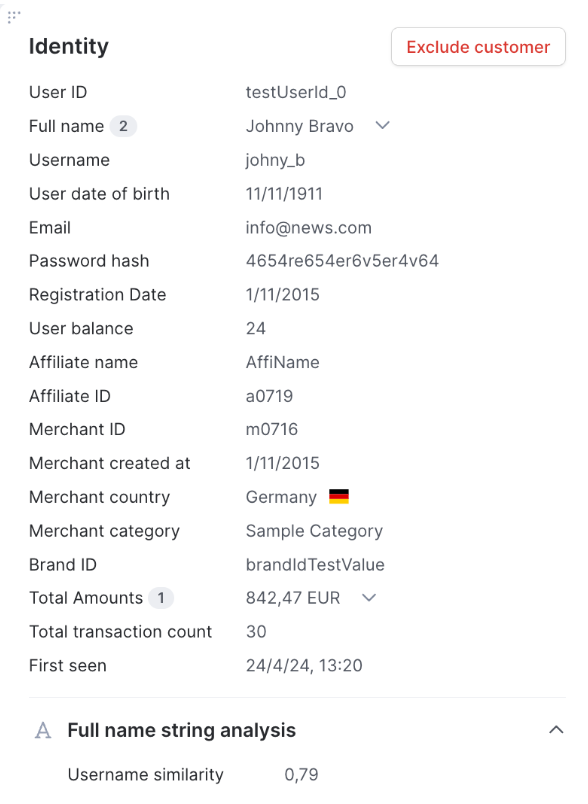Similarity Features
Updated on 12.09.25
1 minute to read
Copy link
Overview
SEON's similarity feature is a core capability designed to detect subtle variations in string-based inputs such as names, emails, or usernames. This is essential in identifying suspicious attempts to create multiple accounts or evade blacklists. The feature enhances fraud detection by identifying data that may not be exactly identical but is functionally or visually similar.
How it works
The feature enhances fraud detection by identifying data that may not be exactly identical but is functionally or visually similar. This is achieved by comparing data points based on:
- The type of the data field (e.g., username, full name, address)
- Algorithms optimized for each specific field type
- Calibrated thresholds to determine similarity levels
The system results in one of three outcomes:
- NOT_SIMILAR: Significant differences
- SIMILAR: Moderate resemblance
- HIGHLY_SIMILAR: Minor variations only
These outcomes are calculated through proprietary scoring methods that SEON fine-tunes continuously in line with emerging fraud tactics. While the actual similarity score is not exposed externally, the result category is accessible and actionable within the platform.
Use cases
- Detect blacklist evasion: Catch users trying to sneak past bans by tweaking their account details. The similarity feature flags changes (think j0hn.doe instead of john.doe) to enforce blacklists more effectively and deter repeat offenders.
- Prevent account linking: Detect users operating multiple accounts using related contact details. By comparing email addresses and phone numbers, you can uncover hidden relationships between accounts and shut down sockpuppet networks.
- Stop multi-accounting: Spot users creating multiple accounts with small data tweaks. From near-identical usernames to recycled info with subtle edits, the similarity feature reveals attempts at bypassing account limits and abusing promotions.
Application examples
- A fraudster attempts to register as "J0hn Sm1th" to bypass a ban on "John Smith"
- Email addresses like "johnny_smith@email.com" and "john.smith@mail.com" are flagged as similar

Rule creation flexibility: SEON enables rule creation using similarity operators:
not similar tosimilar tohighly similar to
These can be used in:
- Datamatch (two fields within one transaction)
- Velocity rules (patterns across multiple transactions)
- Blacklist matching (comparison against a custom list)
Using similarity to fight fraud
The similarity feature empowers fraud teams to take proactive action against evasion tactics without requiring exact data matches, thus improving fraud prevention coverage while maintaining a seamless customer experience.